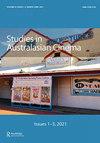The beak that grips: maternal indifference, ambivalence and the abject in The Babadook
IF 0.7
0 FILM, RADIO, TELEVISION
引用次数: 5
Abstract
ABSTRACT This article investigates the depiction of maternal indifference and ambivalence in Jennifer Kent’s film The Babadook. Using the techniques of psychoanalytical criticism I draw on Kristeva’s [1982. Powers of Horror: An Essay on Abjection. Translated by Leon S. Roudiez. New York: Columbia University Press] theory of abjection and Barbara Creed’s [1993. The Monstrous Feminine: Film, Feminism, Psychoanalysis. London: Routledge] application of this to the horror genre to explore the film’s portrayal of repressed grief and the resulting traumatic disruption to the mother/child bond. Taking the protagonist’s troubled relationship with both her son and her bereaved status as my starting point, I argue that The Babadook represents a reimagining of maternal abjection. Both Kristeva and Creed posit that abjection is first experienced as the result of the mother’s refusal to relinquish her hold on the child and to move past the intense dyadic relationship of the infant period. The Babadook inverts this psychic narrative by positioning Amelia’s refusal of this relationship and her lack of proper maternal feeling as the site of her abjection. In this reimagining of maternal abjection, The Babadook presents audiences with a representation of maternal experience that is shocking and confronting. While the narrative arc is ultimately one of redemption the ambiguous ending emphasises the lingering unease inspired by maternal indifference.紧握的喙:《巴巴杜克》中的母性冷漠、矛盾心理和卑鄙
摘要本文探讨了詹妮弗·肯特电影《巴巴杜克》中对母性冷漠和矛盾心理的描写。运用精神分析批评的技巧,我借鉴了克里斯特娃的[1982。恐怖的力量:一篇关于谩骂的文章。莱昂·鲁迪兹译。纽约:哥伦比亚大学出版社,1993年。怪异的女性主义:电影,女权主义,心理分析。伦敦:劳特利奇]将其应用于恐怖类型,探讨电影对压抑的悲伤的刻画,以及由此对母子关系造成的创伤破坏。以主人公与儿子的麻烦关系以及她失去亲人的身份为出发点,我认为《巴巴多克》代表了对母性放逐的重新想象。Kristeva和Creed都认为,母亲拒绝放弃对孩子的控制,拒绝摆脱婴儿时期紧张的二元关系,这是他们第一次感到厌恶的结果。巴巴杜克将阿米莉亚对这段关系的拒绝和她缺乏适当的母性情感定位为她被抛弃的地方,从而颠覆了这种心理叙事。在这场对母性厌恶的重新想象中,《巴巴杜克》向观众呈现了一种令人震惊和直面的母性体验。虽然叙事的弧线最终是救赎,但模棱两可的结局强调了母亲冷漠所激发的挥之不去的不安。
本文章由计算机程序翻译,如有差异,请以英文原文为准。
求助全文
约1分钟内获得全文
求助全文

 求助内容:
求助内容: 应助结果提醒方式:
应助结果提醒方式:


